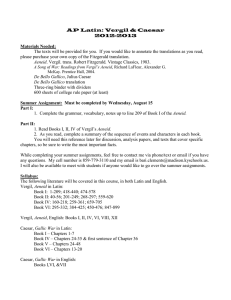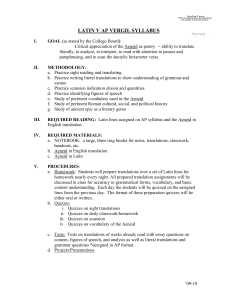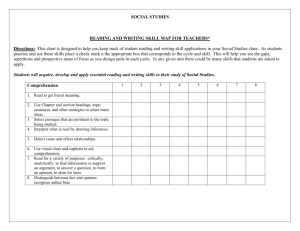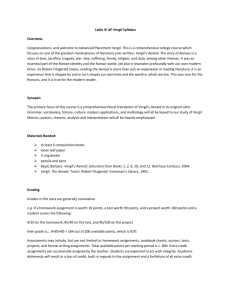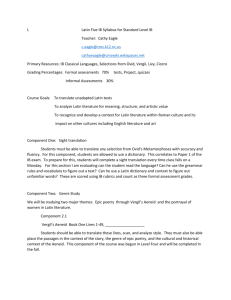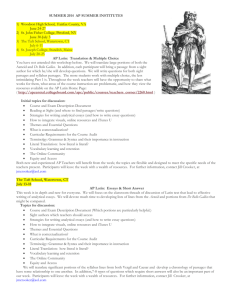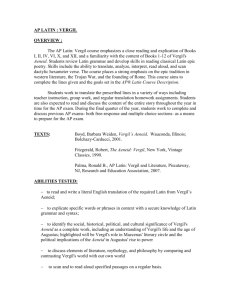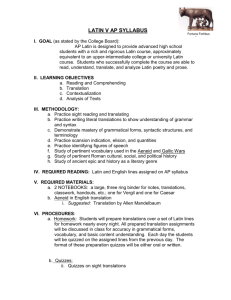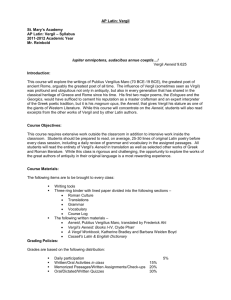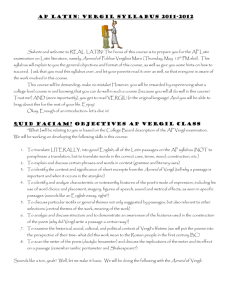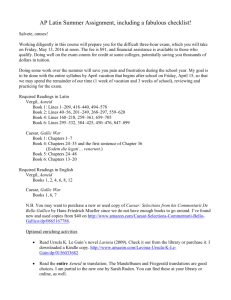Mr. Beck Foreign Language Honors Latin IV UCONN ECE CAMS
advertisement
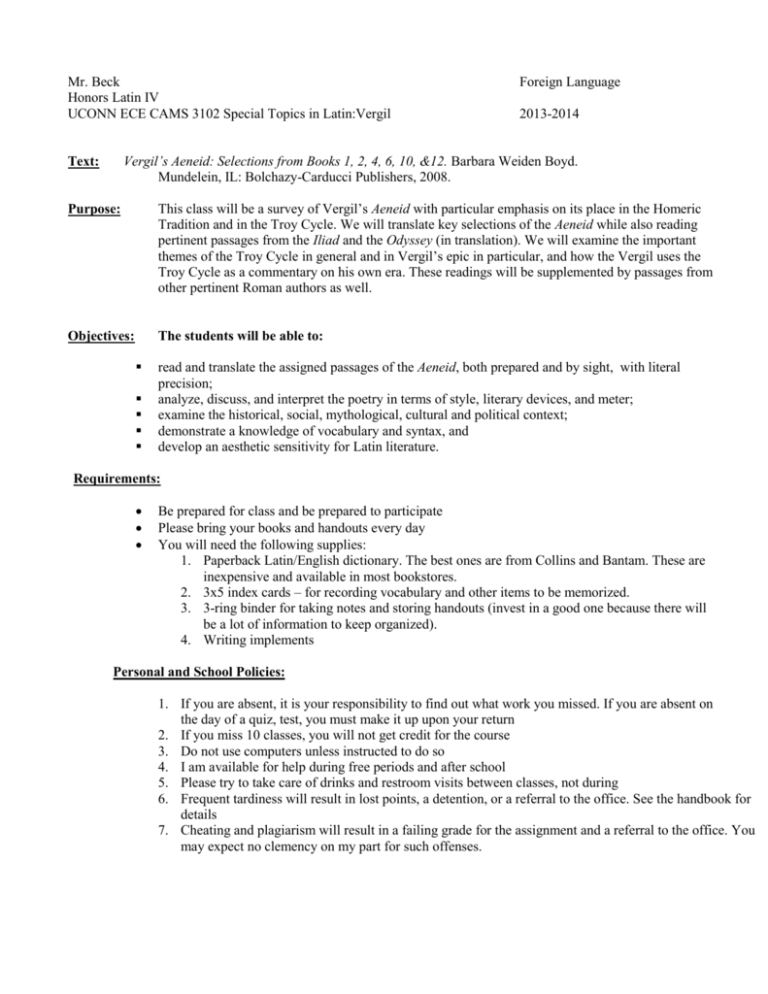
Mr. Beck Honors Latin IV UCONN ECE CAMS 3102 Special Topics in Latin:Vergil Foreign Language 2013-2014 Vergil’s Aeneid: Selections from Books 1, 2, 4, 6, 10, &12. Barbara Weiden Boyd. Mundelein, IL: Bolchazy-Carducci Publishers, 2008. Text: Purpose: This class will be a survey of Vergil’s Aeneid with particular emphasis on its place in the Homeric Tradition and in the Troy Cycle. We will translate key selections of the Aeneid while also reading pertinent passages from the Iliad and the Odyssey (in translation). We will examine the important themes of the Troy Cycle in general and in Vergil’s epic in particular, and how the Vergil uses the Troy Cycle as a commentary on his own era. These readings will be supplemented by passages from other pertinent Roman authors as well. Objectives: The students will be able to: read and translate the assigned passages of the Aeneid, both prepared and by sight, with literal precision; analyze, discuss, and interpret the poetry in terms of style, literary devices, and meter; examine the historical, social, mythological, cultural and political context; demonstrate a knowledge of vocabulary and syntax, and develop an aesthetic sensitivity for Latin literature. Requirements: Be prepared for class and be prepared to participate Please bring your books and handouts every day You will need the following supplies: 1. Paperback Latin/English dictionary. The best ones are from Collins and Bantam. These are inexpensive and available in most bookstores. 2. 3x5 index cards – for recording vocabulary and other items to be memorized. 3. 3-ring binder for taking notes and storing handouts (invest in a good one because there will be a lot of information to keep organized). 4. Writing implements Personal and School Policies: 1. If you are absent, it is your responsibility to find out what work you missed. If you are absent on the day of a quiz, test, you must make it up upon your return 2. If you miss 10 classes, you will not get credit for the course 3. Do not use computers unless instructed to do so 4. I am available for help during free periods and after school 5. Please try to take care of drinks and restroom visits between classes, not during 6. Frequent tardiness will result in lost points, a detention, or a referral to the office. See the handbook for details 7. Cheating and plagiarism will result in a failing grade for the assignment and a referral to the office. You may expect no clemency on my part for such offenses. Evaluation: Students will prepare translation assignments in advance and translate passages by sight, as well as review previously translated passages. Students will participate actively in classroom discussions and through recitations. Students will be assessed by means of homework checks, in-class quizzes, in-class recitation, in-class tests, take-home tests, essays, presentations, brief Latin compositions, and a research paper. Students will be quizzed on vocabulary, grammatical structures, sight translation, poetic figures of speech, rhetorical devices, and meter. Students will be tested on literal translation, content and context of passages, grammar, literary analysis, and textual exegesis. Due to the cumulative nature of language learning, there will be frequent quizzes and tests. There will also be mandatory participation. The key to success is involvement. Quarterly grading will be based on percentages: Tests and other assignments 50% Quizzes 40% Participation/Preparedness 10% Participation and preparedness will also be factors in determining grades Late work and make-ups will not be accepted. There are no extra credit assignments. Class Rules: 1. 2. 3. 4. 5. Be punctual and ready to begin promptly Participate! Do not be afraid to make mistakes and never hesitate to ask questions Do not use computers for things unrelated to class I am available for help during free periods and after school Although I sometimes give bonus questions on quizzes and tests, I do not give extra credit assignments 6. Be polite and respectful to classmates and the teacher. 7. Raise your hand before speaking; do not interrupt others Homework: There will be either written or read homework most nights. Written homework will be checked. Preparation for the day’s lesson will also be noted. Quarterly grading will be based on percentages: Tests = 45% Quizzes = 45% Homework/Preparation = 10% *There may be a major paper assigned at some point during the year, which will count as two tests. Teaching Strategies: The selections listed below will be read and discussed in class each day. Accurate and literal English translation, analysis and interpretation of the verses, recognition of poetic and metrical style, discussion of the author’s meaning and of the passages’ contexts will be ongoing throughout the course. Each class meeting will involve recitation of prepared passages and sight-reading new passages. Teacher presentation and class discussion will cover the central themes of the Aeneid: Stoic and Epicurean philosophy, the Homeric tradition, the Augustan Age, piety, the artistic process and politics, as well as the additional cultural, historical, and literary contexts of the epic in preparation for student essays. A selection of important articles in the secondary scholarship of the Aeneid will be assigned and discussed. Regular practice in scansion and the understanding of meter as a complement to the implications and aesthetic value of the verses. Lessons reviewing grammatical structures and highlighting uses common to poetry, e.g. subjunctive forms, syncopation, special uses of the dative case. Assessments will include frequent quizzes on vocabulary, grammar, poetic devices, and scansion; tests on literal translation, and interpretation; daily translation proficiency checks (prepared and sight). Students will be assigned frequent short essays (at least one per unit) focusing on synthesis, analysis, and interpretation of major themes and key poems/passages in which they support and defend arguments with specific evidence drawn from the Latin text. Students may also be assigned a substantial final research paper, in which they rely heavily on the close reading of the Latin to formulate and support a thesis about a topic covered during the course. Comparison of the common elements, various themes, use of vocabulary and phraseology, metrics and syntax between passages, within passages, and between Vergil and other authors. In class discussion (small group/whole class) comparing and contrasting not only the poems themselves, but also the universal ideas expressed in the epic and the students’ ability to relate to and identify with the Romans.
